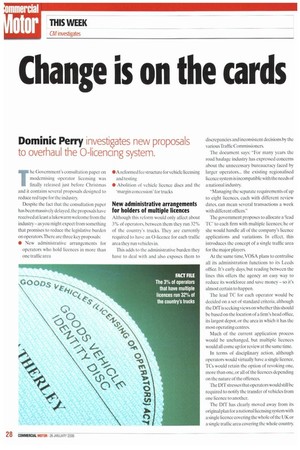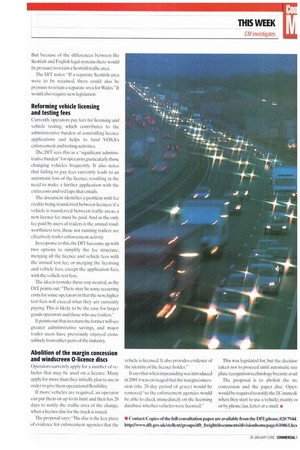Change is on the cards
Page 28

Page 29

If you've noticed an error in this article please click here to report it so we can fix it.
Dominic Perry investigates new proposals to overhaul the 0-licencing system.
The Government's consultation paper on modernising operator licensing was finally released just before Christmas and it contains several proposals designed to reduce red tape for the industry.
Despite the fact that the consultation paper has been massively delayed, the proposals have received at least a lukewarm welcome from the industry —as you might expect from something that promises to reduce the legislative burden on operators.There are three key proposals: • New administrative arrangements for operators who hold licences in more than one traffic area OA reformed fee structure for vehicle licensing and testing • Abolition of vehicle licence discs and the 'margin concession' for trucks
New administrative arrangements for holders of multiple licences
Although this reform would only affect about 3% of operators, between them they run 32% of the country's trucks. They are currently required to have an 0-licence for each traffic area they run vehicles in.
This adds to the administrative burden they have to deal with and also exposes them to discrepancies and inconsistent decisions by the variousTraffic Commissioners.
The document says: "For many years the road haulage industry has expressed concerns about the unnecessary bureaucracy faced by larger operators... the existing regionalised licence system is incompatible with the needs of a national industry.
"Managing the separate requirements of up to eight licences, each with different review dates, can mean several transactions a week with different offices."
The government proposes to allocate a 'lead TC' to each firm with multiple licences: he or she would handle all of the company's licence applications and variations. In effect, this introduces the concept of a single traffic area for the major players.
At the same time, VOSA plans to centralise all its administration functions to its Leeds office. It's early days, but reading between the lines this offers the agency an easy way to reduce us workforce and save money — so it's almost certain to happen.
The lead IC for each operator would be decided on a set of standard criteria, although the DfT is seeking views on whether this should be based on the location of a firm's head office, its largest depot, or the area in which it has the most operating centres.
Much of the current application process would be unchanged, but multiple licences would all conic up for review at the same time.
In terms of disciplinary action, although operators would virtually have a single licence, TCs would retain the option of revoking one, more than one, or all of the licences depending on the nature of the offences.
The DfT stresses that operators would still be required to notify the transfer of vehicles from one licence to another.
The DfT has clearly moved away from its original plan for a national licensing system with a single licence covering the whole of the UK or a single traffic area covering the whole country.
But because of the differences between the Scottish and English legal systems there would be pressure to retain a Scottish traflic area.
The DIF notes: "If a separate Scottish area were to be retained, there could also be pressure to retain a separate area for Wales." It would also require new legislation.
Reforming vehicle licensing and testing fees
Currently operators pay fees for licensing and vehicle testing. which contributes to the administrative burden of controlling licence applications and helps to fund VOSA's enforcement and testing activities.
The DlT sees this as a "significant administrative burden" for operators,pa rticularly those changing vehicles frequently. 11 also notes that failing to pay fees currently leads to an automatic loss of the licence, resulting in the need to make a further application with the extra costs and red tape that entails.
The document identifies a problem with fee credits being transferred between licences:if a x,ehicle is transferred between traffic areas, a new licence fee must be paid. And as the only fee paid hy users of trailers is the annual roadworthiness test, those not running trailers are effectively trailer enforcement activity.
In response to this,the D11' has come up with two options to simplify the fee structure: merging all the licence and vehicle fees with the annual test fee: or merging the licensing and vehicle fees, except the application fees, with the vehicle test fees.
'Me idea is to make these cost-neutral, as the DIU points out:"There may be some recurring costs for some operators in that the new, higher test fees will exceed what they are currently paying. This is likely to be the case for larger good!, operators and those who use trailers" It points out that in return the former will see greater administrative savings, and major trailer users have previously enjoyed crosssubsidy from other parts of the industry
Abolition of the margin concession and windscreen 0-licence discs Operators currently apply for a number of '.c hides that may he used on a licence. Many apply for more than they initially plan to use in order to give them operational flexibility.
II more vehicles are required. an operator can put them on up to its limit and then has 28 days to notify the traffic area of the change. when a licence disc for the truck is issued.
'Ihe proposal says:"The disc is the key piece of evidence for enforcement agencies that the vehicle is licensed. It also provides evidence of the identity of the licence holder."
It says that when impounding was introduced in 21)0 I it was envisaged that the margin concession (the 28-day period of grace) would he removed "so the enforcement agencies would he able to check immediately on the licensing database whether vehicles were licensed." This was legislated for, but the decision taken not to proceed until automatic nur plate recognition technology became avail The proposal is to abolish the mr concession and the paper disc. Open would be required to notify theTC immedi when they start to use a vehicle; mainly oi or by phone. fax, letter or e-mail. •
































































































































































































